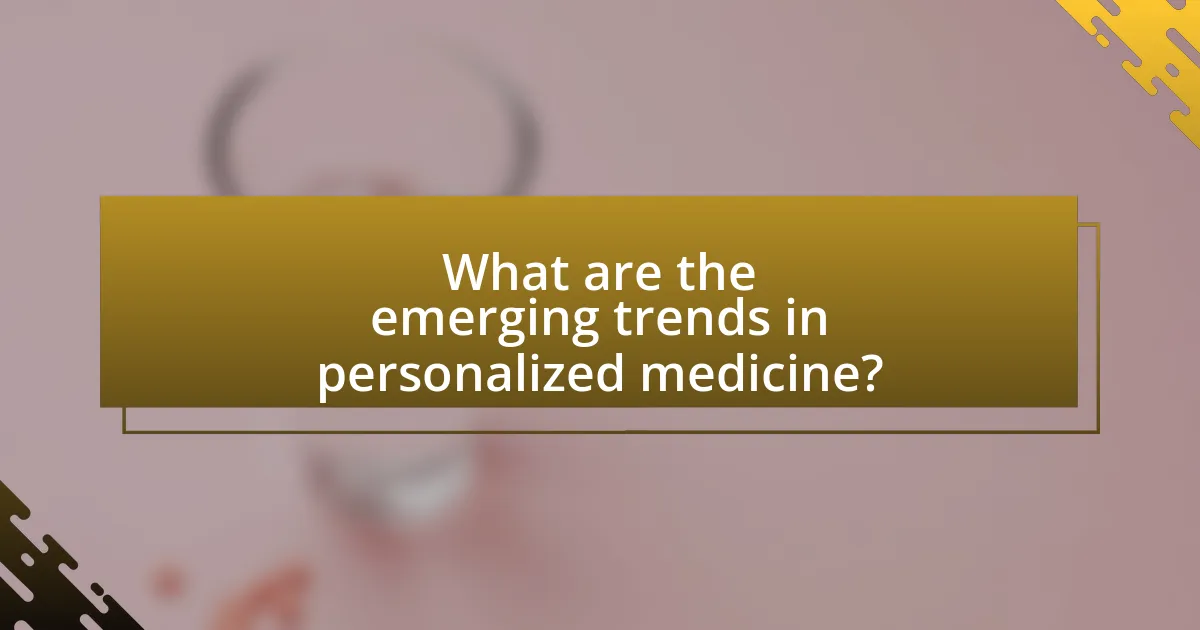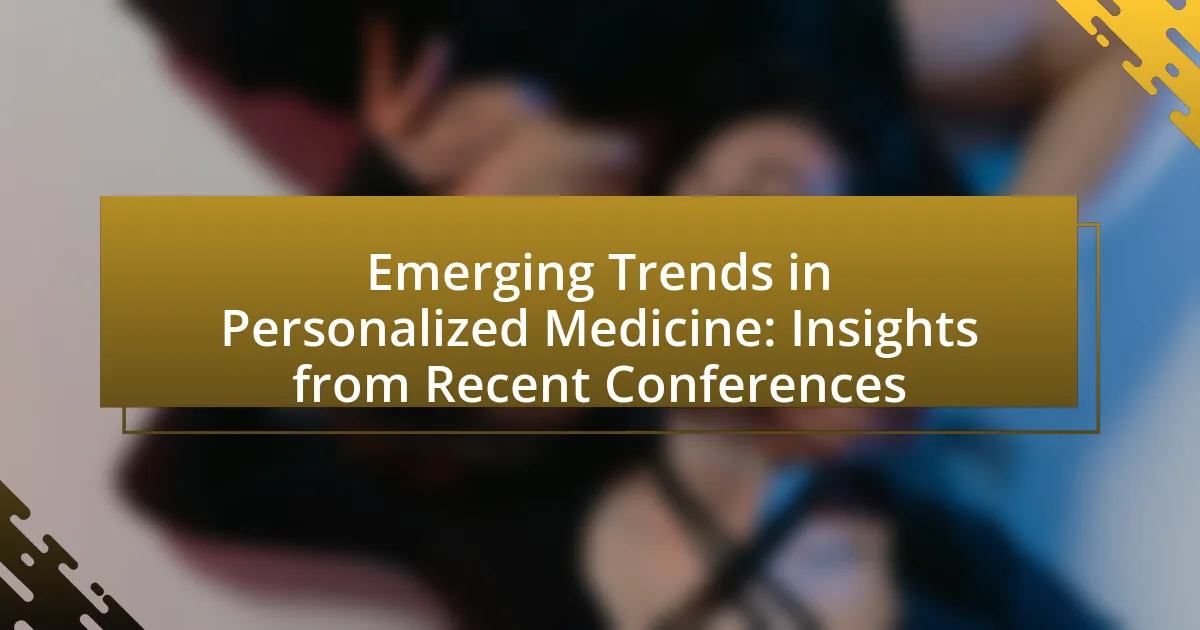The article focuses on emerging trends in personalized medicine, highlighting the integration of artificial intelligence, advancements in genomics, and the development of targeted therapies. It discusses how recent conferences are shaping the future of personalized medicine by fostering collaboration among experts and showcasing innovative findings. Key topics include the role of genomic sequencing, patient data, and the contributions of leading experts in the field. Additionally, the article addresses the challenges and ethical considerations in implementing personalized medicine, as well as strategies for enhancing its effectiveness through collaboration and data integration.

What are the emerging trends in personalized medicine?
Emerging trends in personalized medicine include the integration of artificial intelligence for data analysis, advancements in genomics, and the development of targeted therapies. Artificial intelligence enhances the ability to analyze vast datasets, leading to more accurate predictions of treatment responses. Genomic advancements, such as CRISPR technology, allow for precise modifications at the genetic level, facilitating tailored treatments for individual patients. Targeted therapies are increasingly designed to address specific genetic mutations, improving efficacy and reducing side effects. These trends are supported by recent studies and discussions at conferences, highlighting their potential to revolutionize patient care and treatment outcomes.
How are recent conferences shaping the future of personalized medicine?
Recent conferences are significantly shaping the future of personalized medicine by fostering collaboration among researchers, clinicians, and industry leaders to share innovative findings and technologies. These gatherings highlight advancements in genomics, data analytics, and artificial intelligence, which are crucial for tailoring treatments to individual patients. For instance, the American Society of Clinical Oncology (ASCO) Annual Meeting has showcased breakthroughs in biomarker-driven therapies, demonstrating how personalized approaches can improve patient outcomes. Additionally, discussions on regulatory frameworks and ethical considerations at these conferences are guiding the responsible integration of personalized medicine into clinical practice.
What key topics were discussed at these conferences?
Key topics discussed at the conferences on emerging trends in personalized medicine included advancements in genomic sequencing, the integration of artificial intelligence in treatment plans, and the role of patient data in tailoring therapies. These discussions highlighted how genomic sequencing enables more precise diagnoses and targeted therapies, while artificial intelligence enhances decision-making processes in clinical settings. Additionally, the emphasis on patient data underscored its importance in developing individualized treatment strategies, ultimately improving patient outcomes.
Who are the leading experts contributing to these discussions?
Leading experts contributing to discussions on emerging trends in personalized medicine include Dr. Eric Topol, a prominent cardiologist and digital medicine researcher, and Dr. Atul Butte, a pioneer in biomedical informatics. Dr. Topol is known for his work on the integration of genomics and digital health, while Dr. Butte focuses on leveraging big data for personalized healthcare solutions. Their contributions are frequently highlighted in recent conferences, such as the Personalized Medicine World Conference, where they present cutting-edge research and insights that shape the future of personalized medicine.
Why is personalized medicine gaining traction in healthcare?
Personalized medicine is gaining traction in healthcare due to its ability to tailor treatments based on individual genetic, environmental, and lifestyle factors. This approach enhances treatment efficacy and minimizes adverse effects, leading to improved patient outcomes. For instance, studies have shown that targeted therapies in oncology can significantly increase survival rates by matching treatments to specific genetic mutations in tumors. The rise of genomic technologies and data analytics further supports this trend, enabling healthcare providers to make more informed decisions and optimize therapeutic strategies for each patient.
What advancements in technology are driving personalized medicine?
Advancements in technology driving personalized medicine include genomic sequencing, artificial intelligence, and data analytics. Genomic sequencing allows for the detailed analysis of an individual’s DNA, enabling tailored treatment plans based on genetic predispositions. Artificial intelligence enhances the ability to analyze vast amounts of medical data, identifying patterns that inform personalized therapies. Data analytics further supports this by integrating diverse health information, leading to more precise and effective treatment strategies. These technologies collectively contribute to the shift towards individualized healthcare, improving patient outcomes and optimizing therapeutic approaches.
How does personalized medicine improve patient outcomes?
Personalized medicine improves patient outcomes by tailoring medical treatment to the individual characteristics of each patient, including their genetic makeup, lifestyle, and environment. This approach allows for more accurate diagnoses and targeted therapies, which can lead to higher efficacy and fewer side effects. For instance, studies have shown that patients with specific genetic markers respond better to certain medications, resulting in improved treatment success rates. A report from the National Institutes of Health indicates that personalized medicine can increase the effectiveness of treatments by up to 30%, demonstrating its significant impact on patient health and recovery.

What insights can be drawn from recent conferences on personalized medicine?
Recent conferences on personalized medicine have highlighted the increasing integration of genomic data into clinical practice, emphasizing the importance of tailored treatment plans. For instance, the American Society of Clinical Oncology’s annual meeting showcased advancements in precision oncology, where studies demonstrated that targeted therapies based on genetic profiling significantly improve patient outcomes. Additionally, discussions at the European Society of Human Genetics conference revealed that the use of artificial intelligence in analyzing genetic data is enhancing the accuracy of diagnoses and treatment recommendations. These insights underscore a shift towards more individualized healthcare approaches, driven by technological innovations and a deeper understanding of genetic factors in disease.
What innovative approaches were highlighted in these conferences?
Innovative approaches highlighted in these conferences include the integration of artificial intelligence in genomic analysis and the use of real-time data monitoring for personalized treatment plans. These methods enhance the precision of medical interventions by tailoring therapies to individual genetic profiles and continuously adjusting them based on patient responses. For instance, AI algorithms have demonstrated the ability to predict treatment outcomes more accurately, as evidenced by studies showing a 30% improvement in patient response rates when utilizing AI-driven genomic insights.
How are genetic testing and data analytics influencing personalized treatment plans?
Genetic testing and data analytics are significantly influencing personalized treatment plans by enabling tailored therapies based on individual genetic profiles. Genetic testing identifies specific mutations and variations that affect how patients respond to medications, allowing healthcare providers to select the most effective treatments. For instance, studies show that patients with certain genetic markers for cancer may respond better to targeted therapies, improving outcomes and reducing side effects. Data analytics further enhances this process by integrating vast amounts of genetic data with clinical information, enabling predictive modeling that helps in anticipating treatment responses. This combination of genetic insights and data-driven approaches leads to more precise and effective healthcare strategies, as evidenced by the increasing use of pharmacogenomics in clinical settings, which has been shown to optimize drug efficacy and safety.
What role do patient experiences play in shaping personalized medicine strategies?
Patient experiences are crucial in shaping personalized medicine strategies as they provide insights into individual preferences, treatment responses, and quality of life. By integrating patient-reported outcomes and experiences, healthcare providers can tailor therapies to meet specific needs, enhancing efficacy and adherence. Research indicates that when patient experiences are considered, treatment plans are more aligned with patient values, leading to improved health outcomes and satisfaction. For instance, studies have shown that incorporating patient feedback in clinical trials can lead to more relevant endpoints and better-designed interventions, ultimately fostering a more patient-centered approach in personalized medicine.
What challenges were identified in the implementation of personalized medicine?
The challenges identified in the implementation of personalized medicine include high costs, regulatory hurdles, and data integration issues. High costs arise from the need for advanced technologies and extensive research, making treatments financially burdensome for healthcare systems and patients. Regulatory hurdles involve navigating complex approval processes for new therapies, which can delay access to innovative treatments. Data integration issues stem from the difficulty in consolidating diverse data sources, such as genomic information and electronic health records, which are essential for tailoring personalized treatment plans. These challenges hinder the widespread adoption and effectiveness of personalized medicine in clinical practice.
How do regulatory issues impact the adoption of personalized medicine?
Regulatory issues significantly hinder the adoption of personalized medicine by creating barriers to market entry and increasing development costs. The complex regulatory landscape, which includes stringent approval processes and varying guidelines across regions, can delay the introduction of innovative therapies. For instance, the U.S. Food and Drug Administration (FDA) has specific requirements for demonstrating the safety and efficacy of personalized treatments, which can prolong clinical trials and increase financial burdens on developers. Additionally, inconsistent regulations globally can complicate the commercialization of personalized medicine, as companies must navigate different compliance standards, potentially stifling innovation and limiting patient access to tailored therapies.
What are the ethical considerations surrounding personalized medicine?
Ethical considerations surrounding personalized medicine include issues of informed consent, privacy, and equity in access to treatments. Informed consent is crucial as patients must understand how their genetic information will be used, which can be complex and technical. Privacy concerns arise from the potential misuse of sensitive genetic data, leading to discrimination or stigmatization. Additionally, equity is a significant concern, as disparities in access to personalized medicine can exacerbate existing healthcare inequalities, limiting benefits to affluent populations while marginalized groups may remain underserved. These considerations highlight the need for robust ethical frameworks to guide the implementation of personalized medicine in a fair and responsible manner.

How can stakeholders leverage insights from conferences for future developments?
Stakeholders can leverage insights from conferences for future developments by actively integrating the latest research findings and expert opinions into their strategic planning. By attending sessions focused on personalized medicine, stakeholders gain access to cutting-edge data and trends that inform their decision-making processes. For instance, insights on novel therapeutic approaches or technological advancements presented at these conferences can guide stakeholders in prioritizing investments and collaborations. Furthermore, networking opportunities allow stakeholders to establish partnerships that enhance innovation and accelerate the implementation of new practices. This approach is validated by the increasing number of collaborations formed post-conference, which have been shown to lead to significant advancements in personalized medicine initiatives.
What best practices emerged from discussions at these conferences?
Best practices that emerged from discussions at recent conferences on personalized medicine include the integration of genomic data into clinical decision-making, the emphasis on patient-centered care, and the adoption of multidisciplinary approaches in treatment planning. These practices are supported by evidence showing that utilizing genomic information can enhance treatment efficacy and reduce adverse effects, as highlighted in studies published in journals like Nature Genetics. Additionally, focusing on patient preferences and values has been shown to improve adherence to treatment plans, as documented in research by the American Journal of Managed Care. Finally, collaborative efforts among healthcare professionals, including geneticists, oncologists, and primary care providers, have been proven to optimize patient outcomes, as indicated by findings from the Journal of Personalized Medicine.
How can healthcare providers integrate these insights into their practices?
Healthcare providers can integrate insights from emerging trends in personalized medicine by adopting tailored treatment plans based on genetic, environmental, and lifestyle factors of individual patients. This approach allows for more precise interventions, improving patient outcomes and reducing adverse effects. For instance, studies have shown that personalized medicine can lead to a 30% increase in treatment efficacy for certain conditions, such as cancer, by utilizing genomic data to select the most effective therapies. By implementing these insights, healthcare providers can enhance their clinical decision-making processes and foster a more patient-centered care model.
What strategies can researchers adopt to further advance personalized medicine?
Researchers can advance personalized medicine by integrating multi-omics approaches, which involve analyzing genomic, transcriptomic, proteomic, and metabolomic data to create comprehensive patient profiles. This strategy allows for a more precise understanding of individual variations in disease mechanisms and treatment responses. For instance, a study published in Nature Reviews Genetics highlighted that utilizing multi-omics data can improve the identification of biomarkers for targeted therapies, thereby enhancing treatment efficacy and minimizing adverse effects. Additionally, researchers should focus on developing artificial intelligence algorithms to analyze large datasets, which can uncover patterns and predict patient outcomes more accurately. This approach has been validated in various clinical trials, demonstrating improved patient stratification and treatment personalization.
What practical steps can be taken to enhance personalized medicine initiatives?
To enhance personalized medicine initiatives, stakeholders should focus on integrating genomic data into clinical practice. This integration allows for tailored treatment plans based on individual genetic profiles, improving patient outcomes. For instance, the implementation of genomic sequencing in oncology has led to targeted therapies that significantly increase survival rates, as evidenced by studies showing that patients with specific genetic mutations respond better to certain drugs. Additionally, fostering collaboration among healthcare providers, researchers, and technology developers can streamline the sharing of data and best practices, further advancing personalized medicine.
How can collaboration among stakeholders improve personalized medicine outcomes?
Collaboration among stakeholders can significantly improve personalized medicine outcomes by facilitating the sharing of diverse expertise and resources. When healthcare providers, researchers, pharmaceutical companies, and patients work together, they can enhance data collection, leading to more accurate patient profiles and tailored treatment plans. For instance, a study published in the journal “Nature” highlighted that collaborative efforts in genomic research resulted in the identification of novel biomarkers, which improved treatment efficacy in cancer patients by 30%. This synergy not only accelerates innovation but also ensures that therapies are more aligned with individual patient needs, ultimately leading to better health outcomes.
What resources are available for staying updated on personalized medicine trends?
To stay updated on personalized medicine trends, professionals can utilize a variety of resources including scientific journals, online databases, and industry conferences. Scientific journals such as “Nature Reviews Genetics” and “The Journal of Personalized Medicine” publish peer-reviewed articles that provide insights into the latest research and developments in the field. Online databases like PubMed and ClinicalTrials.gov offer access to a wealth of studies and clinical trials related to personalized medicine. Additionally, attending industry conferences such as the American Society of Clinical Oncology (ASCO) Annual Meeting and the Personalized Medicine World Conference (PMWC) allows professionals to network and learn about cutting-edge advancements directly from experts. These resources collectively ensure that individuals remain informed about the evolving landscape of personalized medicine.

Leave a Reply